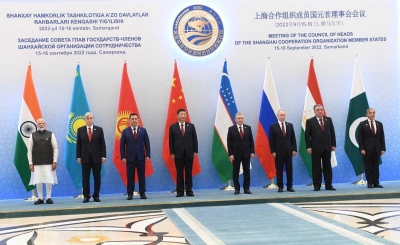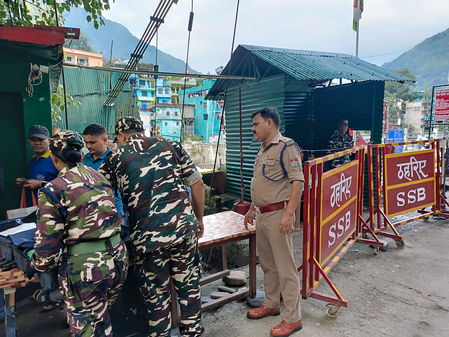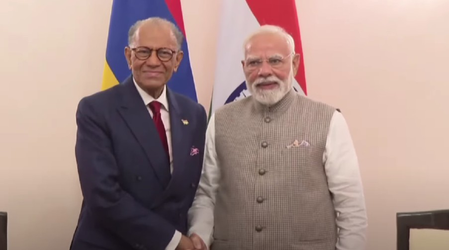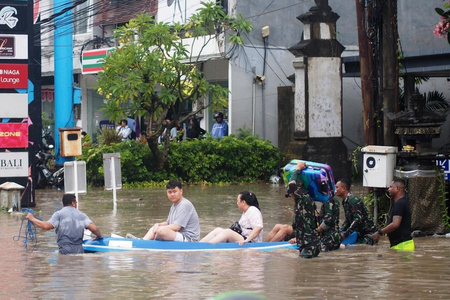
New Delhi, Sep 11 (IANS) Current geopolitics is marked by the post-Cold War phenomenon of open warfare giving way to ‘proxy wars’, the competitive rise of China in relation to the US in military, technological, and economic term,s and the positioning of India as a world power that exercised strategic autonomy in handling international relations.
India needs to make its best diplomatic moves to develop bilateral relations based on mutual security and economic interests in a world divided by ideological and regional alliances. Forums like BRICS and SCO, dominated by the China-Russia axis and Quad led by US for countering Chinese designs of expansion in the Indo-Pacific, illustrate such alliances and the very fact that India was active in all the three shows the diplomatic prowess of this country in pursuing the strategy of achieving bilateral friendships without giving up on its policy of remaining non-aligned towards all world powers.
This has worked well for India — helping to raise its status as an advocate of world peace and humanitarian development. India rightly believes that this is an era of multipolarity in the world order, and therefore, a major call for its diplomatic endeavour would be to ensure that there is no return to the days of the Cold War.
India would be best served by an approach to international relations that was marked by flexibility, strategic patience and advocacy of what was in the broader interests of humanity. Our diplomacy has to combine the art of communication with the gift of ideation. Ideation is an intellectual ability — that everybody might not have — of being able to see what lies ahead. This suggested that our best brains should be used there.
The greatest scientists of all time, Albert Einstein, famously said that ‘imagination is more important than knowledge’. He was referring to the ability to look beyond the facts in front and not to ‘miss the wood for the trees’. No two bilateral relationships were the same, and in the Indian context, this was a major guideline for our diplomats who would have to work to make any such relationship look special in the geopolitical backdrop.
The Middle East, for instance, is a region where India has to develop even relationships with the three major players there — Israel, Iran and Saudi Arabia — who had different alignments. The support of China and Russia to Iran against the total backing extended to Israel by the US carried a potential for the revival of the Cold War. This added to the diplomatic challenge facing a ‘non-aligned’ India.
It is a matter of great satisfaction that our foreign policy flows directly from Prime Minister Modi, who is personally known to most world leaders and who has a grip on geopolitical trends and alignments. India’s diplomatic power is an important instrument for safeguarding its national security and economic interests. Foreign policy, by definition, is a product of national security and economic concerns — in that order — and the National Security Advisor’s role in shaping foreign policy has become very important.
Diplomacy today, as a reader of the prevailing security scenario, supplements the assessment of national Intelligence agencies. National strategy is therefore an integral response now — embracing foreign policy, economic interests and factors affecting internal security. The geopolitical scenario is prone to swift changes, and the life span of any strategy, therefore, was also shortened because of the need for ‘mid-course’ corrections.
Prime Minister Modi’s participation in the SCO summit at Tianjin in China and his one-on-one meetings with President Xi Jinping and the Russian President, Vladimir Putin, on the sidelines, evoked a somewhat strange response from US President Donald Trump, who thought India was getting drawn to the China-Russia camp at the cost of Indo-US friendship. Trump talked of ‘punitive tariff’ for India for the latter’s oil trade with Russia, and while justifying it, he made it a point to emphasise that ‘we get along with India very well’. This suggests that India should take a balanced view of its relationships with both the US and Russia and make diplomatic moves accordingly, to accommodate different bilateral requirements.
India has the sovereign right to determine its own spectrum of friends and adversaries at a given point in time and plan its strategic approach to them, keeping the overall world scenario in view. The Chief of Defence Staff (CDS) Gen Chauhan has reiterated that the two prime threats to the national security of India were the border disputes with China and the Pakistan-sponsored cross-border terrorism. The Sino-Pak strategic alliance working primarily against India came into play during the military confrontation between India and Pakistan — that was precipitated by the Pakistan-directed terrorist attack at Pahalgam — and this places the nexus between China and Pakistan on top of the national security agenda of India.
President Trump had condemned ‘Islamic terrorism’ in no uncertain terms, but seemed inclined to have trade deals with Pakistan, ignoring the fact that Pakistan was the biggest culprit as far as the harbouring of terror groups or export of faith-based terrorism was concerned. Indian diplomacy should ‘educate’ American policy makers on the lessons they should draw from the Middle East, where the Israel-Iran conflict was fast developing into a ‘civilisational clash’ between Islam on one hand and Zionism and Christianity on the other. Religion-based conflicts lead to a war of attrition and pose a basic threat to the democratic world as a whole. Any moves for the democratisation of Arab societies will promote peace in the Middle East. India and the US — the two largest democracies of the world — must act together for the larger goal of peace in the region and in the world at large.
Prime Minister Modi’s emphasis on making India self-reliant in every sphere by promoting ‘make in India’ campaign, following a policy of bilateral friendships with all without getting aligned with any world power and favouring a peaceful resolution of all military conflicts of our times whether it is Ukraine-Russia ‘war’, Iran-Israel confrontation or the situation in Gaza, is a strategic mix that served India well. India must fiercely work for countering the hostile Sino-Pak axis, should make a distinction between China and Russia, should deal with its relationships with US and Russia without getting aligned with either side — taking due note of the fact that a certain personal bonhomie existed between Trump and Putin, should concentrate on improving its position in the South and should actively pursue the ‘Act East’ policy.
In a multipolar world, this will strengthen India’s stature as a world power. Domestically, issues of governance were always important in democratic India with its diversity in terms of communities, regions and class disparities, and they contributed to setting the image of the country before the world outside. A strong Centre is needed to sustain federal values. While law and order is the responsibility of states, internal security is the lead function of the Centre, in which states, regardless of the political complexion of the government, fully cooperated with the former. This policy line needs to be clearly stated by the Centre.
‘Nation First’ was recognised by the people of India as a concept much before President Donald Trump gave the call of ‘America First’. Prime Minister Modi stated on his first visit to White House to meet Trump that India understood the call and had no reason to feel unsettled about it. This behoved a country of India’s size and strength. It is heartening to note that the Modi government has handled relations with countries — big and small — on merit, depending totally on how they served our national security and economic interests.
(The writer is a former Director Intelligence Bureau)
–IANS
dcpathak/skp




